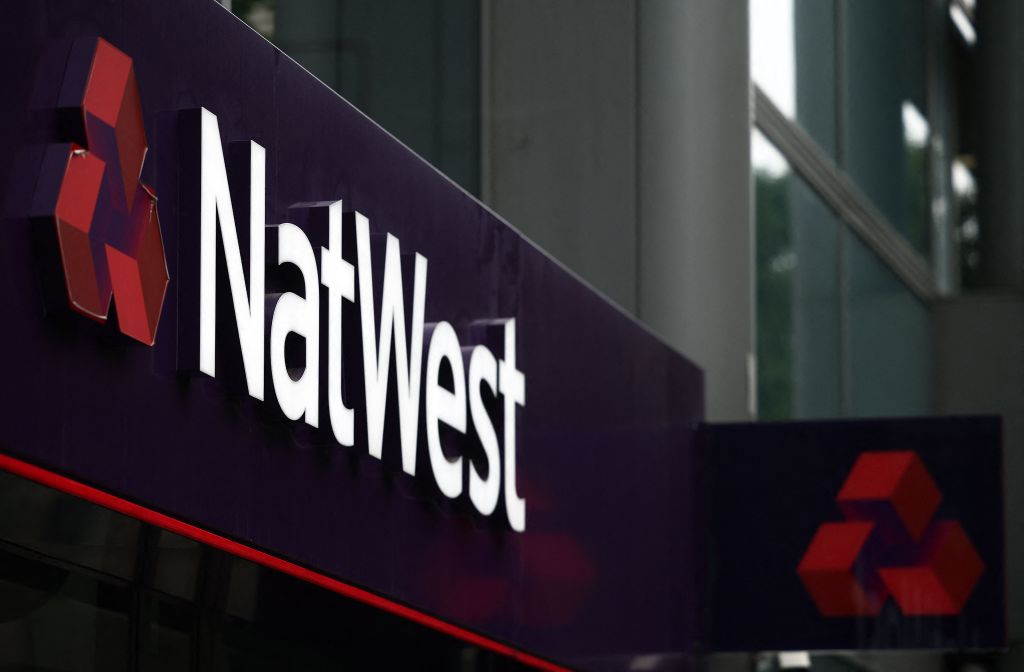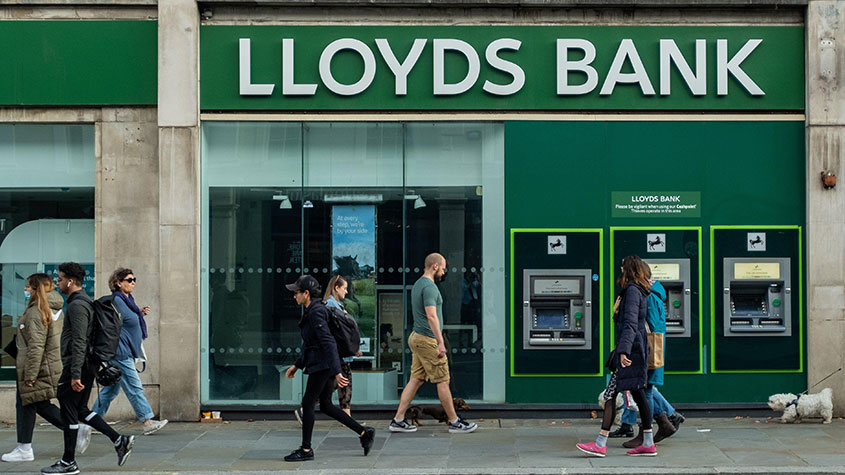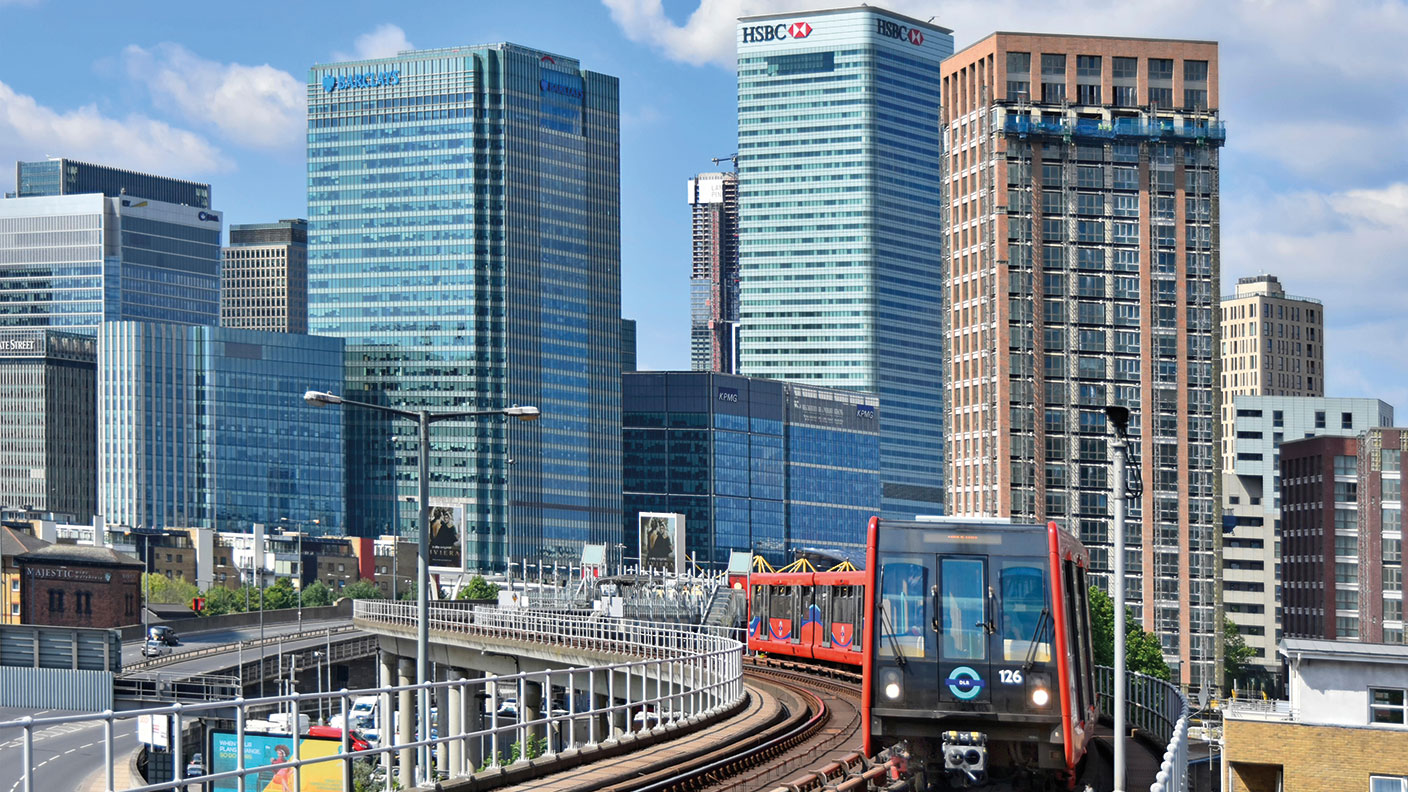UK banking stocks: what’s the latest this results season, and are they worth a look?
All five major UK banks released their annual results in February, reporting profit increases. But the sector has long been unloved by investors. Are UK banking stocks hidden gems, or better avoided?

Pedro Gonçalves

Get the latest financial news, insights and expert analysis from our award-winning MoneyWeek team, to help you understand what really matters when it comes to your finances.
You are now subscribed
Your newsletter sign-up was successful
Want to add more newsletters?

Twice daily
MoneyWeek
Get the latest financial news, insights and expert analysis from our award-winning MoneyWeek team, to help you understand what really matters when it comes to your finances.

Four times a week
Look After My Bills
Sign up to our free money-saving newsletter, filled with the latest news and expert advice to help you find the best tips and deals for managing your bills. Start saving today!
It has been a challenging few years for the UK banking sector after valuations took a hit in the aftermath of the Brexit referendum, remaining low to this day.
The trend is reflected among UK equities in general, but banking stocks may present an investment opportunity for some investors if, as some believe, they are undervalued.
On the one hand, the surge in interest rates since December 2021 has generally been good news for the sector’s earnings. However, lenders have also had to compete for deposits by offering savers higher rates of interest, and the cost-of-living crisis has threatened defaults on loans.
MoneyWeek
Subscribe to MoneyWeek today and get your first six magazine issues absolutely FREE

Sign up to Money Morning
Don't miss the latest investment and personal finances news, market analysis, plus money-saving tips with our free twice-daily newsletter
Don't miss the latest investment and personal finances news, market analysis, plus money-saving tips with our free twice-daily newsletter
What’s more, last spring, there was turmoil in the banking sector overseas, and this spooked investor confidence. In Europe, the banking giant Credit Suisse collapsed and had to be bought out by UBS. Meanwhile in the US, Silicon Valley Bank, Signature Bank and First Republic Bank all went under.
Despite concerns around contagion, this did not develop into a 2008-style banking crisis and UK banks held up. However, the events did not do anything to help valuations.
Speaking at Loughborough University on 16 February, Bank of England Governor Andrew Bailey noted this very point.
Reflecting on recent events, he described Covid as the “first big test” for the banking reforms carried out in the wake of the global financial crisis. It is a test that the sector has navigated “effectively”, he said. So, with this in mind, the fact that valuations are still “in the doldrums” is “a puzzle expressed often by banks”, he added.
Against this backdrop, you might be wondering whether now is a good time to invest. Do puzzlingly low valuations present a good investment opportunity, or is the sector set to remain unloved?
We look at the pros and cons of investing in UK banking stocks, while also highlighting some of the key themes from this year’s results season.
Are UK banks undervalued?
Reflecting on current market valuations, AJ Bell investment director Russ Mould notes that “all of the FTSE 100 banks trade below book value”. In other words, they are trading at a discount, because the total value of their assets is higher than the market price of the shares.
This suggests that “the market does not believe the asset valuations, or it does not believe they can make a decent, risk-adjusted return on those assets, or a combination of the two”, he explains.
| Bank | Price/book, Q4 2023 |
|---|---|
| HSBC | 0.97x |
| Lloyds | 0.91x |
| Natwest Group | 0.78x |
| Standard Chartered | 0.58x |
| Barclays | 0.48x |
This in itself is not a reason to buy – investors would need to be confident that the market will catch up, realising the inefficiency at the heart of its pricing.
And while Owen Freshwater, investment manager at Evelyn Partners, acknowledges that “UK banks remain one of the cheapest sectors in the UK stock market”, he thinks that “it is difficult to find a near-term catalyst for the sector”. He highlights concerns about rising loan losses and squeezed margins as two factors that are “weighing down the sector”.
Matt Britzman, equity analyst at Hargreaves Lansdown, is more optimistic though. He believes that “there are several tailwinds yet to play out that could give room for upside beyond current consensus”.
“With the return of real wage growth, plus a stabilising housing market, consumers should remain resilient”, in his view. “At the same time, banks are seeing easing conditions in the mortgage market and what looks to be a peak in terms of consumers shifting to higher cost savings accounts”, he adds.
With this in mind, he believes that investors should think of banks as being “like a bond portfolio that’s rolling on to higher yields over the next few years”, adding that “Lloyds and NatWest look best placed to benefit from these improving trends”.
Which UK banks should you consider?
The risk associated with banks depends on the lender, so here we break down the key things you need to know about the five major lenders in the UK. HSBC, Lloyds, Barclays, NatWest and Standard Chartered – the big UK-listed banks – share a lot of key features but there are some differences.
HSBC and Standard Chartered are increasingly global businesses with strong focuses on Asia. They are more insulated to some of the domestic problems in the UK, but also exposed to additional risks overseas – most recently challenges in the Chinese economy.
NatWest, Barclays and HSBC all have an investment arm which leaves their shares exposed to higher risk, but potentially higher reward too. Barclays’ investment arm has been in the news recently, for example, with many investors calling for the bank to ditch this part of its business as it has dragged on profits.
We take a look at some of the key themes impacting the five major banks this results season.
Barclays: ambitious plans announced
Barclays announced its 2023 results to investors on 20 February. As part of this, it unveiled a three-year plan to improve its operational and financial performance.
As well as looking to boost returns to more than 12% by 2026, the bank is planning to cut costs by £2bn. Furthermore, it is looking to return £10bn of capital to shareholders between 2024 and 2026 through dividend payments and share buybacks.
This news came just over a week after the bank announced its plans to acquire Tesco Bank, further building on its proposition for retail customers.
The bank also has an investment arm, but some investors are calling for it to focus solely on its retail proposition, with the investment business having dampened profits in recent years.
Commenting on the bank’s recent results, Mould highlights that the bank’s “net asset value per share (NAV) is growing”, adding that this “might be a start in persuading investors that its shares are too cheap, especially given the bumper cash returns”.
That said, he warns that the bank will need to “keep its nose clean and avoid any fresh litigation and conduct costs”, as well as “keep[ing] loan losses to manageable levels”.
Natwest: retail share sale could offer a discount
Natwest released its 2023 results on 16 February, revealing strong performance for the year.
The bank’s pre-tax profits were up 20% compared to 2022, exceeding analyst expectations. This is the highest they have been since 2007. The bank proposed a healthy dividend of 11.5 pence per share, as well as announcing plans to launch a £300 million share buyback scheme in 2024.
Conscious of falling interest rate expectations, the bank has been cautious in its outlook going forward.
“Unlike Barclays, NatWest have reset expectations and lowered their expectations for the coming years, in part due to fears that falling interest rates could lead to lower returns”, says Freshwater. “Despite this, the dividend remains well covered and they are committing to further buybacks”, he adds.
It also looks like a Natwest retail share offer could take place later this year, with the government looking to sell its 35% stake in the bank. Investors are expecting the government to offer the shares at a discount to their full price to encourage interest, which could create an attractive entry point.
HSBC: challenges in China’s real estate sector
HSBC also saw its pre-tax profits rise to $30.3 billion in 2023, increasing by 77% compared to the previous year. Despite this, they came in below analyst predictions, marred by challenges in the Chinese economy. The bank has a strong presence in the region.
Chief executive Noel Quinn highlighted several steps the bank had taken to reward shareholders over the course of the year, including the “highest full-year dividend since 2008, three share buy-backs last year totalling $7bn, and a further share buy-back of up to $2bn”.
However, investors appear to have focused more on the bank’s challenges in China, with the share price dropping by its biggest amount since 2020 in the wake of the results on 21 February.
“While the potential for growth is greater [in Asia], the ongoing issues with the Chinese economy, notably in the real estate sector, have led to both [HSBC and Standard Chartered] tak[ing] significant impairments on their loans”, says Freshwater. Until these problems are resolved, he thinks it is “difficult to see a catalyst” for their valuations improving.
Standard Chartered: also exposed to China
Standard Chartered also reported an increase in profits when it released its results on 23 February. Pre-tax profit jumped by 27% to $5.7bn.
“We have increased full year dividends, up 50%, and have announced a new $1bn share buyback, bringing our total shareholder distributions to $5.5bn since January 2022”, CEO Bill Winters also outlined.
Like HSBC, though, the bank also reported losses related to its Chinese real estate portfolio.
Lloyds: embroiled in car finance scandal
Lloyds released its 2023 results on 22 February, reporting pre-tax profits of £7.5 billion. This was a 57% increase compared to the year before, and slightly exceeded analyst expectations.
The company also announced a dividend of 1.84 pence per share, and a share buyback programme of up to £2 billion.
Despite this, the news was overshadowed by the bank putting aside £450 million for potential customer redress. This is in light of the latest customer protection scandal. Lenders are currently preparing for a regulatory review into the mis-selling of car finance.
“[T]he FCA’s motor finance review [is] likely to lead to compensation akin to the PPI scandal”, says Freshwater.
Should you invest?
With all of this in mind, does the sector present an attractive investment opportunity? In short, it depends on what you are looking for.
A common theme across all of the banks this results season has been returning capital to shareholders, both in the form of generous dividends and share buyback schemes. So, if you are looking for income generators in your portfolio, the sector could be worth considering – particularly given that you can currently buy banking stocks up cheap.
Responding to the Barclays release earlier this month, Mould wryly commented, “Maybe banks are going to come back into fashion after all, if only because they start to function as cash machines rather than operate them”.
The dividend yield across the five major banks is as follows:
| Bank | Forward dividend yield |
|---|---|
| Barclays | 4.89% |
| Natwest | 7.45% |
| HSBC | 8.21% |
| Standard Chartered | 2.64% |
| Lloyds | 6.01% |
Source: Morningstar Direct as of 23 February 2024.
One thing to bear in mind is that interest rates are forecast to fall later this year, with inflation now coming under control. This could mean that the sector’s earnings are not as strong going forward as they were in 2023.
Furthermore, if you are looking for growth, you might be better off investing elsewhere. There are no guarantees that investors will realise the valuation discount on banks any time soon, so prices could stay deflated.
The regional and regulatory challenges faced by some of the individual names are also something to keep an eye on, if you are considering investing.
If you want exposure to the sector without putting all of your eggs in one basket, holding a small amount across several banks could be a better strategy than taking a larger stake in just one.
Get the latest financial news, insights and expert analysis from our award-winning MoneyWeek team, to help you understand what really matters when it comes to your finances.
Katie has a background in investment writing and is interested in everything to do with personal finance, politics, and investing. She previously worked at MoneyWeek and Invesco.
- Pedro GonçalvesContributor
-
 Should you buy an active ETF?
Should you buy an active ETF?ETFs are often mischaracterised as passive products, but they can be a convenient way to add active management to your portfolio
-
 Power up your pension before 5 April – easy ways to save before the tax year end
Power up your pension before 5 April – easy ways to save before the tax year endWith the end of the tax year looming, pension savers currently have a window to review and maximise what’s going into their retirement funds – we look at how
-
 The UK cities where it’s cheaper to buy a house than rent
The UK cities where it’s cheaper to buy a house than rentFor people in some areas of the country, home ownership is a distant dream. But for others it can be surprisingly affordable.
-
 Crypto scams – what to look out for
Crypto scams – what to look out forFraudsters are using cryptocurrency scams to lure investors desperate for high returns - here is how to spot and avoid them
-
 Lloyds Bank shares could see an interest-rate windfall
Lloyds Bank shares could see an interest-rate windfallAnalysis Interest rates are heading higher, which could be good news for Lloyds Bank shares as profits are set to grow.
-
 Is abrdn’s eye-catching 9.2% dividend yield sustainable?
Is abrdn’s eye-catching 9.2% dividend yield sustainable?Tips Shares in investment manager abrdn currently yield 9.2%. Generally speaking, says Rupert Hargreaves, it pays to be sceptical of very high dividend yields. So is that the case here, or is abrdn one for income investors to tuck away?
-
 S4 Capital – a company that still has much to prove
S4 Capital – a company that still has much to proveTips Audit delays set shares tumbling at advertising agency S4 Capital. It needs to show it can turn growth into profits, says Bruce Packard.
-
 When to buy shares in NatWest, Britain's worst bank
When to buy shares in NatWest, Britain's worst bankTips Rising interest rates should lift profits for the banking sector if inflation doesn’t get out of control, says Bruce Packard.
-
 How UK banks went from Big Bang to universal failure
How UK banks went from Big Bang to universal failureCover Story The 1986 deregulation shook up the banks, but the all-in-one model that it created is bad for customers and investors. Specialists do a better job – as the real fintech winners are showing, says Bruce Packard
-
 Evergrande: Chinese property giant spooks global markets
Evergrande: Chinese property giant spooks global marketsNews Global markets fell this week as investors worried about the fate of Evergrande, China’s most indebted property developer, which is teetering on the brink of default.
